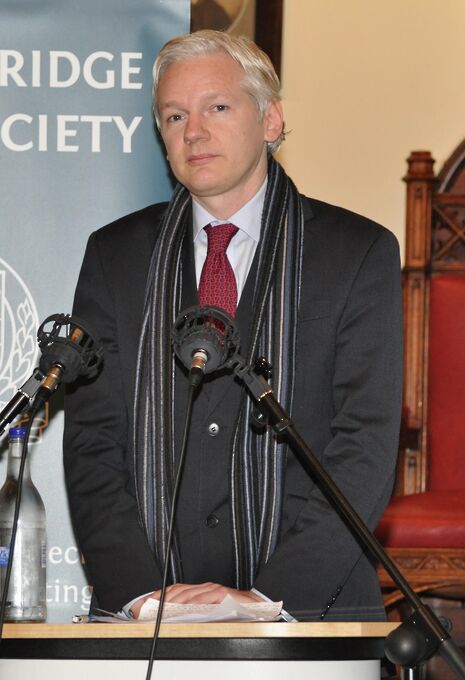Julian Assange speaks to Union
Wikileaks founder Julian Assange addresses an audience of over 700 students
Julian Assange addressed the Cambridge Union Society today, in a rare public appearance.
Assange gave an hour-long talk in which he paid tribute to the power of "radical publishers" such as Wikileaks to bring about major international upheaval. The director and public face of the whistleblower website travelled from Norfolk, where he is currently under house arrest, to speak to a packed Union chamber.
The talk, which was open exclusively to Union members, was overseen by a team of eight security guards who enforced a blanket ban on audio and visual recording devices. Assange himself was critical of this ban, describing it as “a bit rough”, though admitted that it had helped avoid a "press conference", adding "everywhere I go turns into a bit of an opera".

Wikileaks, an international organisation that aims to publish secret, classified and private information with the stated intention of bringing about open governments, has been leaking documents to media organisations since 2006.
Assange criticised what he identified as the current privatisation of censorship, claiming that important information is disappearing globally into centralized archives owned by companies outside of judicial control.
Reflecting on the role of the internet, he stated that “it is not a technology that favours freedom of speech”, calling it “the greatest spying machine ever made”.
His words come after claims by top American officials, including Barack Obama and Hilary Clinton, that the political upheaval in Egypt was organised on the American social media websites, Facebook and Twitter.
Assange objected to this, directing attention to Egyptian activists’ advice to avoid Facebook altogether, following a failed uprising four years earlier which saw its main players tracked down via the website and allegedly beaten and incarcerated. Assange said that, though Facebook and Twitter had played a role in the Arab Spring, theirs had not been as significant as Al Jazeera’s.
Instead Assange praised the ability of Wikileaks to engineer popular reform, through the release of information that made it impossible for the West to stand up in support of those regimes involved. Such information, he claimed, "enables us to cut selected ties...that could be used to prop up one regime by another.”
Assange, who alleged that Wikileaks had been subjected to an economic embargo by the Bank of America, suggested that US economic censorship was “as pernicious as Soviet censorship.” He claimed that the bank had attempted to bring down the not-for-profit organisation with the aid of a top Washington law firm, at a reported fee of $2million a month.
The loss incurred by Wikileaks over a similar embargo imposed by organisations such as Visa and PayPal was an estimated £5million – a figure Assange claimed now makes it financially impossible to publish all leaks at the rate at which they come in.
In light of this, Assange admitted he was up against “great odds”, and yet he remains positive. “It is amazing to see what we have achieved,” he said “simply by sticking to principles”.
Two members were escorted off the premises during the talk for allegedly using recording equipment. Mehdi Jaffer, a second-year student at Pembroke College, was asked to leave after being caught using his phone. The student initially protested, informing the security guards that he was just texting a friend. Members of the Union Committee later apologised to Jaffer, who was invited to re-enter the talk but declined.
The evening was brought to a close with questions from the floor. The Union President, Lauren Davidson, declared that due to legal reasons, only questions relating to the talk would be accepted. Davidson initially objected to a questioner's reference to Bradley Manning, the American soldier suspected of leaking the diplomatic cables to Wikileaks, who remains inprisoned in Virginia. Assange was asked whether Wikileaks lacked the capacity to properly protect its sources, and while he insisted on answering, he explained that he was unable to say much owing to Manning’s legal status.
Julian Assange is currently appealing a UK court decision to extradite him to Sweden, on charges of sexual misconduct.
 News / Colleges charge different rents for the same Castle Street accommodation2 March 2026
News / Colleges charge different rents for the same Castle Street accommodation2 March 2026 News / News in Brief: waterworks, wine woes, and workplace wins 1 March 2026
News / News in Brief: waterworks, wine woes, and workplace wins 1 March 2026 News / Climate activists protest for ‘ethical careers policy’1 March 2026
News / Climate activists protest for ‘ethical careers policy’1 March 2026 News / Angela Merkel among Cambridge honorary degree nominees27 February 2026
News / Angela Merkel among Cambridge honorary degree nominees27 February 2026 News / Private school teacher who lied about Cambridge degree barred from teaching27 February 2026
News / Private school teacher who lied about Cambridge degree barred from teaching27 February 2026









